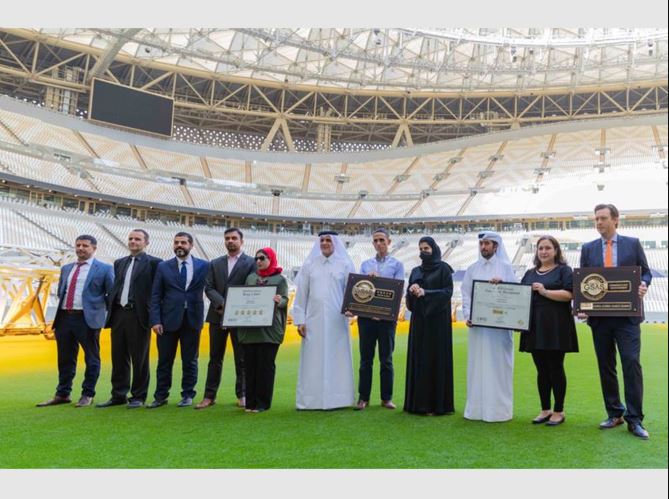DOHA: FIFA World Cup final venue Lusail Stadium has achieved a five-star rating under the Global Sustainability Assessment System, the Qatar News Agency reported.
The rating system is administered by the Gulf Organisation for Research & Development.
The 80,000-person capacity venue has several environmentally friendly features, including water-saving systems.
The roof is made from PTFE, a material that protects the stadium from warm winds and keeps out dust. This sustainability feature allows enough light for the pitch to grow while providing shade to reduce the burden on the stadium’s air conditioning.
Its design, inspired by the interplay of light and shadow, is based on the fanar lantern to depict the Arab and Islamic world’s golden age of art and craftsmanship.
Lusail received a five-star GSAS Design & Build rating and a Class A* GSAS Construction Management rating.
The certificates were presented to executives from the Supreme Committee for Delivery and Legacy at a special event on Monday.
They included deputy director general Ghanim Al-Kuwari, sustainability executive director Bodour Al-Meer, and sustainability communications manager Jassim Al-Jaidah.
“This recognition from GORD is an important part of our FIFA World Cup journey,” said Al-Kuwari. “Sustainability has been central to our plans from the start as we are determined to develop venues that boost local communities here in Qatar long after the tournament. We are very proud to receive these awards and pay tribute to everyone involved in the construction of Lusail Stadium, an incredible venue that will host the biggest international football match on the planet, the FIFA World Cup final later this year.”
Al-Meer said achieving these ratings was a testament to the hard work of the project team to prioritize sustainability features from the design phase through to construction and operation.
“In addition to the roof, the project site has conserved 40 percent more water than conventional stadium developments thanks to efficient fixtures and leak detection systems,” he said.
GORD founding chairman Dr. Yousef Alhorr said Lusail Stadium had set a “new precedent” in environmental excellence, guided by the SC’s sustainability strategy, by meeting the “exacting” GSAS standards.
“We congratulate the SC for advancing climate action by successfully translating green building principles into impactful practices. This is testament to the strong commitment to sustainability which has been apparent from before ground was broken at Lusail and other venues,” he said.
The chairman said Qatar’s hosting of the World Cup was a milestone as all of its stadiums would be designed, built, and operated in line with the highest sustainability standards, as well as obtaining a certificate from a neutral party to abide by these standards.
The two-stage process of obtaining sustainability certificates took time and effort, Alhorr said.
The first stage was the evaluation process, which included field visits throughout the project’s estimated seven to eight-year lifespan to ensure the building specifications aligned with the construction.
The second stage was the review of thousands of documents by the office to ensure the accuracy of the information and the credibility of adherence to the required standards.
Obtaining the highest classifications was challenging as it required the project to adhere to environmental sustainability standards which entailed 50 sub-criteria, Alhorr added.
The sub-criteria were organized into eight major axes: Energy efficiency, water consumption, environmentally friendly materials, location, urban communication, indoor and outdoor environment, and operating practices.
Lusail Stadium project manager Tamim Al-Abed said the stadium’s receipt of two sustainability certificates confirmed the committee’s efforts to implement World Cup projects sustainably, adding that Qatar had delivered on its promises to adhere to strict sustainability standards throughout all stages of stadium construction.
He said the most important criteria that contributed to Lusail Stadium receiving the certificates were the selection of building materials, operating equipment, and cooling devices in the stadium in an energy-efficient manner, transferring exports sustainably, and monitoring and controlling waste, electricity consumption, dust and noise during the construction period.
He also said the FIFA World Cup Qatar 2022 would be a green tournament because it considered sustainability requirements at all stages of project implementation, beginning with design and ending with project delivery and operation.
Lusail Stadium will host 10 matches, beginning with Argentina against Saudi Arabia on Nov. 22 and concluding with the final on Dec. 18, which is also Qatar National Day.
It will house several civic facilities for the local community after the tournaments.
Any seats removed from the ven

